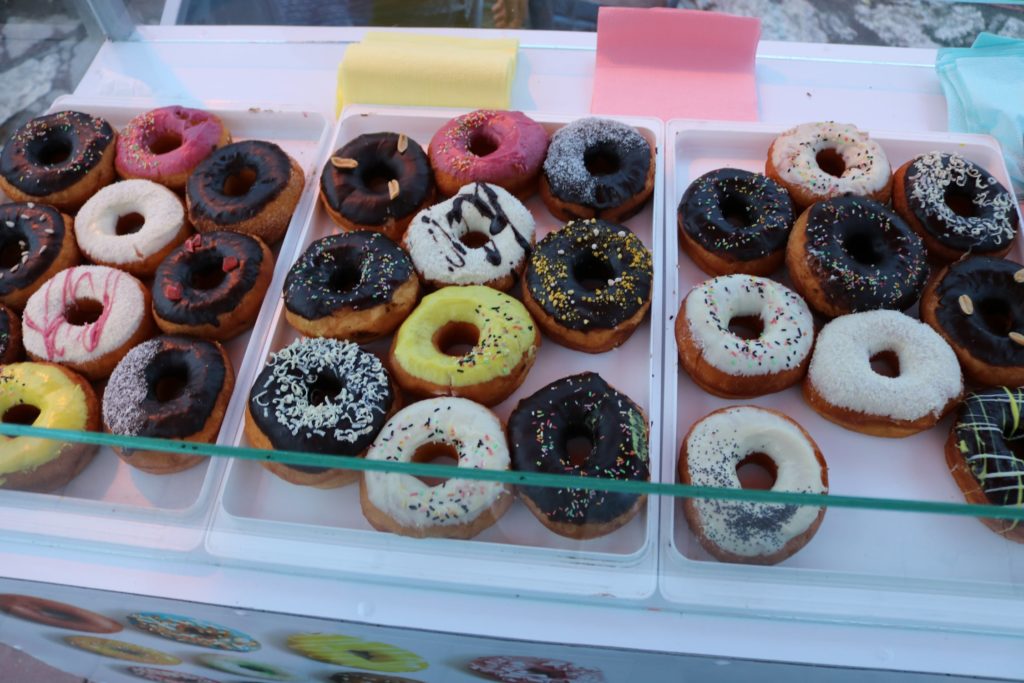By Raina “Scar” Hunter
The donut shop on Castro Street was open 24 hours. The hungry, the curious and the cold found themselves there in the ‘80s, before technology and the impersonal took over. Male hustlers and their sophisticated sugar daddies, winos who drank beer, and runaways in shock from the mean streets found a friendly smile — perhaps a free donut — from a well-meaning neighbor in the donut shop we called home. I lived around the corner from the laundromat where my cousin Stephanie got a job after coming to stay for the summer, realizing my sister and I went hungry a lot.
Kelly and JT hung out there a lot. Kelly had blond hair that hugged her shoulders and wore heavy black eyeliner that never obscured her blue eyes, which danced with laughter, lively and quick. A confident optimist, though she mostly lived on the streets with her three kids, all younger than six years old. JT, I remember he was from Montana. He had a beard, a scraggly one that looked like a small animal that had died somehow perched on his chin. He was good-natured and would cool hot apple fritters by waving them in the crisp fall air, then took them inside and fed the younglings.
Crusty, a Vietnam vet drifter who had a drinking problem. He was a skilled gardener, sometimes working in a small garden that was part of a church that gave out free sandwiches.He would brag to us he had once worked as a gardener in Buckingham Palace. He would spin tales like a carnie conning a crowd, but his stories were free. We called him Crusty Old Fuck, but his real name was Michael Longum. I know his nickname was awful. He had a few choice words he called some of us as well. Michaels’s father used to own the Pilsner Inn, a bar near Church and Market streets. He had a chest as stout as wide as the side of a boat. Once he took off for months, returning with tales of walking through a desert somewhere. He told us about the intense heat and isolation. After relaying his travels, he puked up parts of what appeared to be a lizard. We were never sure what it was. He became a living legend.
Jubb-Jubb, the best talker of the group. A day after we shared a joint together, I ran into him the next day.
“That weed was super. It was the right day and time. I was stoned all day!” he said.
Once he sat next to me at the donut shop, while a few people laughed at a dress I had borrowed from my mother’s closet. Some guy called it a muumuu. It was orange and white and super-short. Everybody started laughing. “That’s not a muumuu,” Jubb-Jubb said. “That’s a ‘60s sundress. Where did you get it?” I told him my mother loaned it to me.
“That was your mother’s dress?” he exclaimed, his eyes widening in surprise. “Your mother couldn’t look good in it as you do now. That’s vintage. One day, everyone is going to want to wear that. Everything will be recycled. You must take a picture of yourself in that dress.”
I never did. Jubb-Jubb’s kind words were enough. Jubb-Jubb was an old, seasoned punk rocker with a head of hair that was ruined by multiple dye jobs, a faded brown like a hungry bird in the winter. In the old days, he took a lot of LSD and lived at the house of Tommy Tadlock, who played with Angels of Light and The Lockettes. He left Tommy’s house, dropped the angry attitude and became one of the most peaceful and witty people I ever knew. On a cold November night, he soothed the feeling of some girl who wanted to beat me up because I said I liked The Cure. He lived among the shadows and neon lights of Castro Street, a bright star in our somber galaxy. My friends tumble like tumbleweeds in the vast prairie of my memory, my once lonely childhood that became a city of friends. My soul is rich from knowing them.
The donut shop is closed now, and the space has been split into two places. The food smells good, but I haven’t walked in there. Like dandelions, my friends blew away. The nooks and crannies of the world will protect them from the “average” cookie-cutter people who judge anybody who is different.


